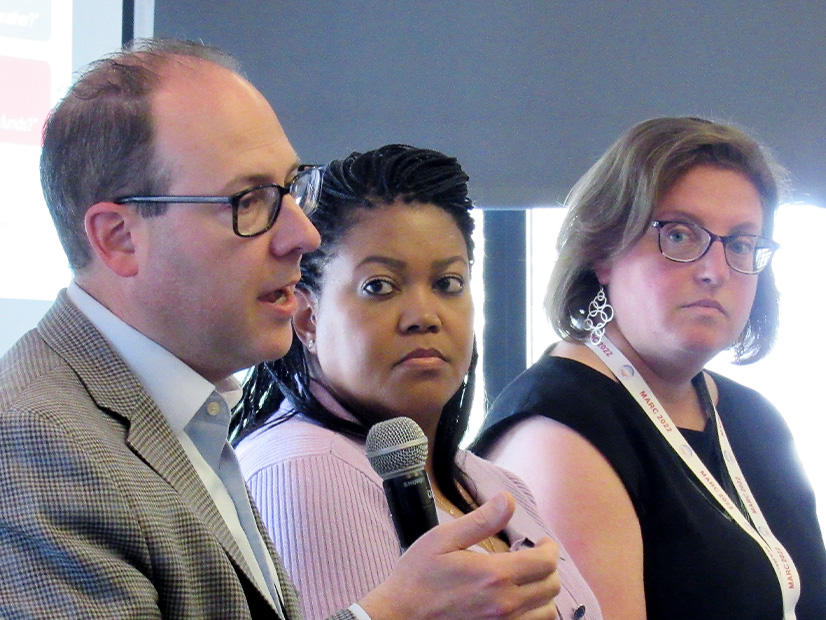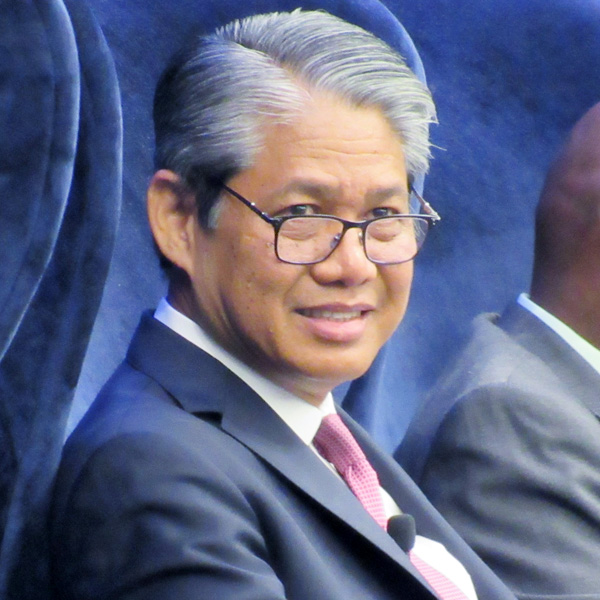CHICAGO — The Mid-America Regulatory Conference’s (MARC) annual meeting last week bore the tagline “Building the New Normal” with themes that ranged from climate justice and workforce diversity to FERC Order 2222 and the ongoing solar panel investigation.
During a June 20 panel, PricewaterhouseCoopers partner Dennis Curtis said some utilities’ zero-carbon goals are “aspirational” while others are “grounded in lots of process and data.” He said some pilot projects now in their infancy will no doubt be the technology relied upon in 2050 by a zero-carbon industry.
“We cannot do this work at any cost,” Reed Smith partner and former FERC commissioner Colette Honorable said of the clean energy transition. She said the shift cannot be “painted with a broad brush” and must account for customer affordability, particularly for underserved minority and low-income communities.
“We can’t pull out the rug from under people. This has to be thoughtful,” she said. Honorable reminded the audience that communities across the country are currently strapped trying to budget gasoline, groceries, medicine and gas bills alongside their electric bills.
The transition must also be navigated against more ubiquitous severe weather events, she said. “They have names we’ve never heard of and temperatures we’ve never seen.”
Case in point: the MARC meeting was held amid record-tying temperatures in Chicago. Wednesday’s high of 101 degrees Fahrenheit matched the previous record set in 1995.
Julia Friedman, Oracle Utilities’ director of regulatory affairs, said the pandemic and ensuing inflation means that more customers are making other sacrifices to pay their energy bills.

Friedman said more efficiency and demand measures on the residential customer side are necessary and can be more powerful than simply decarbonizing the supply side. She said her company’s research shows that residential customers’ actions can cut the equivalent of 130 coal plants’ carbon emissions output by 2040.
“There’s still so much efficiency to be had,” Friedman said. “When you have at scale, millions of customers taking action, that’s very meaningful, and that has to be part of the conversation.”
Honorable, an independent director for Southern Co., said she recently attended the utility’s shareholder meeting where multiple individuals owning just one share apiece stood to speak about the importance of climate goals.
“These are not decisions that companies are making because of large investors,” Honorable said. She added that “we need so much more transmission” to integrate clean energy.
 ComEd CEO Gil Quiniones | © RTO Insider LLC
ComEd CEO Gil Quiniones | © RTO Insider LLCComEd CEO Gil Quiniones said utilities must plan the grid for the future climate, not today’s. He said the energy system should not be unevenly split between the “haves” and the “have nots.”
“We have to extend the grid into our customers’ homes,” Quiniones said.
Illinois Speaker of the House Chris Welch said the state’s bipartisan Clean Energy Jobs Act (CEJA) comes at a time when other states are neglecting to have honest conversations about climate change.
He said the law is the nation’s most equitable climate legislation and will positively impact Illinois for “years to come, decades to come.” He pointed out the legislation is supported by both environmental and labor groups.
“That was damn near impossible,” Welch said Wednesday morning. “We’re a leader in this country, in the Midwest … American can and should be a fierce leader in this arena.”
Illinois Commerce Commission Chairman Carrie Zalewski said she thinks of her life as “before CEJA and after CEJA.” She said the commission is focused on “huge dockets” to implement the bill.
Zalewski said her concern for the next five years is “minding the gap,” as MISO executives often say. She said that means overseeing the clean-energy transition reliably, managing ever-higher energy costs, and solving MISO’s capacity shortfall. Zalewski said she’s currently focusing on getting power from capacity-flush PJM’s lower-priced northern Illinois territory downstate to MISO’s southern Illinois footprint.
Order 2222 Will Boost Reserves
Katharine McCormick, the Illinois commission’s assistant director of policy, said FERC’s Order 2222, which opens wholesale RTO and ISO markets to distributed energy resource aggregators, might help MISO’s current 1.2-GW capacity shortfall in its Midwest region, which includes downstate Illinois.
 MISO Deputy General Counsel Tim Caister | © RTO Insider LLC
MISO Deputy General Counsel Tim Caister | © RTO Insider LLCMcCormick said a variety of resources contributing on the grid is the best path forward but said the state questions MISO’s 2030 go-live date for Order 2222 compliance. (See MISO Stakeholders Protest RTO’s Order 2222 Implementation Timeline.)
MISO Deputy General Counsel Tim Caister said the implementation plan reflects its current technological limitations. He said a new market software platform needs to be in place before aggregators can participate in the RTO’s markets. MISO also needs more technology, secure communications channels, and a comprehensive review process before aggregations can provide wholesale supply, Caister said.
“We’re moving from a static to a dynamic environment,” he said.
Solar Investigation Slows Development
A panel discussion touched on the U.S. Department of Commerce’s March announcement that it is investigating some Asian solar module manufacturers for circumventing tariffs imposed on China in 2012.
 Illinois Commissioner Maria Bocanegra and NextEra Energy’s Anthony Pedroni | © RTO Insider LLC
Illinois Commissioner Maria Bocanegra and NextEra Energy’s Anthony Pedroni | © RTO Insider LLCNextEra Energy’s Anthony Pedroni said the investigation is setting solar developers back by upwards of six months. “The damage has been done in the near term,” he said. “Ships literally turned around and went back to their ports.”
Pedroni said the administration’s two-year pause on new tariffs stands to help projects already in development, but future projects need economic certainty and long-term investment signals. He said a decade of the “hammer” of anti-dumping tariffs has done little to spur domestic solar manufacturing.
“If the goal has been manufacturing, it’s not working … We just have outsourced this particular industry to the world,” he said.
He also said President Biden’s use of the Defense Production Act to accelerate domestic production of solar panels requires at least a 24-month lead time.
“[The] worst outcome is project failure,” Pedroni said. He said he was hopeful that the investigation’s results will be a “blip,” albeit a “damaging and expensive blip.”
Making Do with a Leaner Workforce
Panelists contemplated how energy companies and organizations can manage with a shrunken available workforce.
“There were years when people were banging down the doors to come work for us,” Southern Co. Gas Vice President of Human Resources Lindsay Hill said. “Our mindset around work has completely changed.”
With more jobs available than total workers, Hill said, employees will now leave a premier utility “for a dollar more an hour.”
She said that during the pandemic, she was able to drive her children to school for the first time ever because she was working from home. She said the emphasis on flexibility is a holdover from the pandemic.
Hill reminded audience members that the mid-century’s workforce “is sitting in third grade right now.”
 Hispanics in Energy CEO Jose Perez | © RTO Insider LLC
Hispanics in Energy CEO Jose Perez | © RTO Insider LLC“We have to get into elementary schools,” she said. “We want to expose people as early as we can that the energy industry is an option … It might not be as sexy, the utility industry … but it is very stable.”
Hispanics in Energy CEO Jose Perez said Hispanics often lack the higher education necessary to become involved in the energy industry. He said he believes the country could use a development track to get more Hispanics involved in energy careers, facilitated in part by state commissions.
Perez also said a relaxation of the industry’s drug policies, especially concerning marijuana, can help ease the employee shortage.
Jeanine Otte, director of workforce development for equal access nonprofit Elevate Energy, said her company will recruit for organizations that deal with people who have been affected by the criminal justice system. She said her team offers stipends that include transportation to work.
Zalewski said with about a quarter of American adults having some brush with the criminal justice system, it’s worth companies rethinking some hiring policies. She said it’s simply “the larger reality of the system in which we work.”
Panel Debates Weather, Fuel Procurement
As is the case with most regulatory conferences these days, a panel revisited the 2021 February winter storm that froze much of the Southwest and almost brought the Texas grid to its knees.
Texas commissioner Will McAdams said “as painful as it is,” it’s useful to revisit ERCOT’s near-grid collapse during the storm. “Our system did not return to normal for five days,” McAdams said during a June 20 panel discussion. (See Texas Lawmakers Dig into Power Outages.)
McAdams called the failure to plan for emergencies and communicate during the storm Texas’s “own 9/11.” He said the Public Utility Commission has taken “drastic” steps since then. “We’ve taken a lot of regulatory actions in a short amount of time.”
McAdams said ERCOT has almost doubled its amount of ancillary service capability since the winter storm. He said with an increasing amount of renewable penetration on the system, ancillary services are only going to become more important for the state’s standalone interconnection.
“Due to our islanded status, we experience ramping phenomena more than others,” he said.

McAdams said the commission is attempting to “crack the code” of which loads are too critical for service interruptions.
Allen Fore, vice president of public affairs for Kinder Morgan, said expanding natural gas pipelines and storage should help limit the fallout from weather events, but development and permitting remains a “nightmare.”
“One thing we know is that memories fade over time,” he said. “As the crisis fades into memory, the political will fades.”
Fore said to build natural gas infrastructure, developers need long-term secure contracts from credit-worthy companies, something that’s not presently happening.
“We’re not going to build anything and hope somebody will use it,” he said. “We have to have the customer will, which ultimately is the political will.”
Luke Wiles, Enel Green Power’s senior hydrogen strategist, said hydrogen can become a deployable and dispatchable resource when renewable generation wanes.
“Batteries are good for short-term fluctuations,” he said, explaining that batteries struggle to provide a good backup when renewable output slumps for days at a time.
“Hydrogen, on the other hand is a good backup because it can be stored indefinitely … It can repower the grid with clean fuel [for] a longer duration,” Wiles said.
NARUC Workshop Eyes Future Technologies
Following the MARC meeting, the National Association of Regulatory Utility Commissioners convened for a workshop to discuss what technologies might be needed as fossil plants announce retirement.
Experts said investments in carbon capture and storage, pollution controls, and using coal waste will be necessary to prolong the operational lives of coal plants in the face of climate concerns.
Jacquie Fidler, vice president of environmental sustainability at coal-miner CONSOL Energy, said her company is contemplating the development of a 300-MW waste coal and biomass plant near its Pennsylvania Mining Complex.
“This project will not advance unless we can achieve net negative CO2 emissions,” she said. CONSOL will decide in the coming months whether to move forward with the plant and is working through whether the plant is feasible for commercial operation, Fidler said.
SPP Director of State Regulatory Policy Talina Mathews said carbon capture will be key going forward because fossil units, along with nuclear units, will be necessary for some time. She also said lost tax dollars from retiring plants have “tremendous” negative economic effects on their host communities.
Doug Scott, vice president of strategic initiatives at the Great Plains Institute, said last year’s Storing CO2 And Lowering Emissions Act passed by Congress should result in larger capacity pipelines for CO2 transport. He said the larger pipelines make sense as future carbon sequestration picks up, noting he employed a similar strategy for water lines when he served as mayor of Rockford, Ill.




